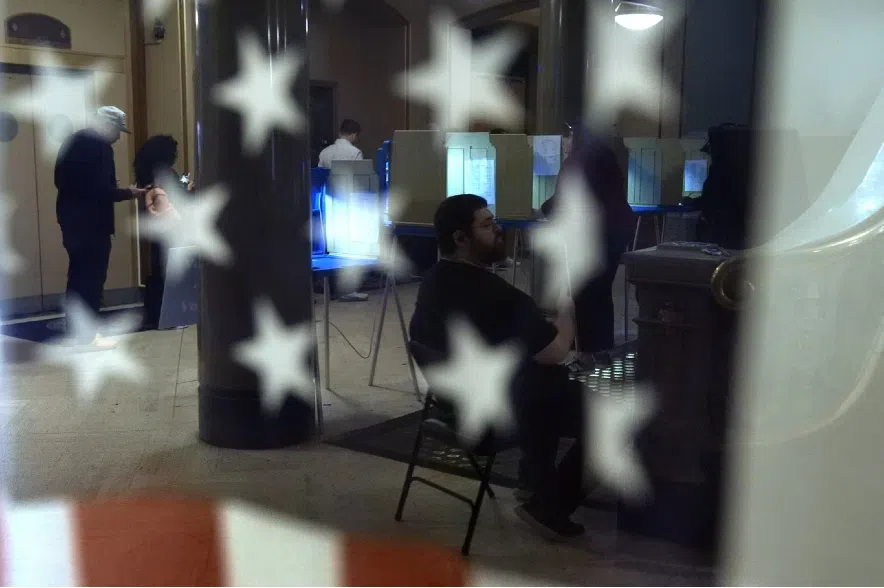A re-elected Donald Trump as President of the United States could bring conversations of the cut Keystone pipeline expansion, NATO payments, and trade and tariff talks, according to former Consul General to New York, Pamela Wallin.
Wallin weighed in on Trump’s victory over Democratic candidate Kamala Harris on the Evan Bray Show with guest host Taylor MacPherson, on Wednesday morning.
Wallin, a current senator from Saskatchewan, said Trump’s win stemmed from voters casting their ballots in their own financial interest.
Listen to Wallin’s full interview on The Evan Bray Show with guest host Taylor MacPherson:
MacPherson: Joining us on the line now is somebody who’s been watching Canadian US politics very closely. Pamela Wallin is a senator representing Saskatchewan in Ottawa, as well as Canada’s former consul general in New York City, and we find her in Canada’s capital, this morning. Good morning, Senator Wallin, how are you, and how are you feeling after last night’s election?
WALLIN: Well, just a little tired because I wanted to stay up till the middle of the night to watch this, the speech, which I did. So, I got a couple of hours before I came into the office today. I do care a lot about the Canada-U.S. relationship, and having lived in the U.S., I care about this. It was a fascinating night because this is now bigger than a MAGA movement, which I think both pollsters and the media tried to explain. This is a new coalition and a serious realignment of politics stateside. So, it’s interesting for them, it’s interesting for us, and I think it’s a message for politicians everywhere. People didn’t vote because they were Black, Hispanic, or a woman, or old, or young, they voted in their own economic interest. It takes us back to the wise words of James Carville a couple of decades ago “It’s the economy stupid.” It always is.
MacPherson: You were the second person to quote Carville on this show this morning. It always comes back to which candidate will put more jingle into my pockets. Okay, Senator Wallin, while a lot of our callers this morning were very pro-Trump, there were also some real concerns raised about the potential impact on Canada and on our economy. Do you think we’re headed for another potential tariff war with our southern neighbours?
WALLIN: I think this relationship is always difficult. Democrats actually historically tend to be more protectionist than Republicans, but because the political map is shifted, it is going to take some deft handling. I think our prime minister in Canada thinks that this has renewed his raise on debt, right, that he’s the one that can take on Trump, but we actually need to take the issue seriously. Other countries, but most particularly, America want us to pay our share of NATO and step up our dispense our defence spending so that we can be a reliable partner. They want us to tighten up our borders, which we should be doing for our own sake. There might well be tariffs, and there will be a re-discussion of trade deals. Again, they’ve signalled the things they’re worried about, the dairy quotas, the supply management system, the digital services tax, which is a problem for them. I think that some of the negotiations will be handled by others. I found it interesting that Danielle Smith, who just received overwhelming support from her own people in Alberta, thanks congratulated President-elect Trump, and that has reopened the whole discussion about Keystone pipelines because she said there should be more pipelines. That was President Biden’s first act when he came into office to cancel Keystone but everybody that is an expert in the energy field says the use of oil and gas is not diminishing anytime soon, and we still need to be able to get it out of the ground and transport it to those that need it. So that will be an interesting part of the discussion.
MacPherson: I know Senator Pamela Wallin is with us, of course, former Consul General to New York as well. I’m glad that you brought up Keystone XL. I know that Donald Trump is in favour of it. He told Brian Zinchuk of Pipeline Online that he was in favour of it back in 2016, and chances are he is still in favour of it. Now, will Trump’s support be enough, or does the government of Canada need to step up and sort of reverse its course?
WALLIN: Well, that’s what we’re going to see. Again, I’m thinking the provincial players are going to be very important on this, on these issues, because of the jurisdictional questions, but also their willingness to fight for this. I think we’re seeing a real change in tone, whether it’s Scott Moe saying “We’re not paying the carbon tax,” or Danielle Smith saying her equivalent of “drill, baby, drill.” We’re going to keep doing this. This is not only our livelihood in Alberta, but it’s a huge contribution to the national economy, and that’s how we pay our bills and pay for things like healthcare. So I think there’s going to be pressure building a lot of places from a lot of different positions, and because of the Canada-United States- Mexico Agreement, the Free Trade Agreement is up for review in 2026 the discussions are underway. I think we need to be prepared to have these discussions about a lot of things because this can’t be dismissed anymore. This is, as I said, kind of a fundamental realignment. When people start saying the most important thing to me is the price of gas and groceries and all of the exit polls and the special poles that were done there, and we watched it all last night on the coverage. It was that specific. It was it was about the price of gas at the pump. It was about the price of groceries, which is, of course, affected by the price of gas at the pumps for the trucks that deliver these products and the ships that bring them into our country. So it’s a core, it’s a fundamental economic issue. So I think we have to now hear the message, not only stateside but hear that same message here. We’re hearing it from voters. I’m just not sure we’re listening.
MacPherson: Senator Pamela Wallin is joining us from Ottawa, sharing her thoughts after Donald Trump’s re-election in stunning fashion last night. Okay, we’ve talked a little bit of oil so far. Senator Wallin, but I wanted to talk a little bit more on the energy front. Trump’s policy is pretty clear when it comes to ramping up oil production, and just this week, Ottawa announced this emissions cap for our own oil and gas industry, which many are saying is going to be devastating all on its own. When you combine that with Trump’s drill, baby, drill, policies, I can only imagine our energy sector is going to see some lean years ahead.
WALLIN: The emissions caps are a really fundamentally bad policy because they don’t accomplish the stated goal. So if you’re going to impose such draconian measures that kill jobs, that impact not only the energy industry, but every industry, primarily agriculture, takes a huge and instant hit because of its reliance on energy, and that’s core to us, of course, in Saskatchewan. These are bad policies, which I think are now going to be highlighted even more specifically. I think you’ve got the response from the western provinces on these kinds of approaches. Honestly, I think this has really more to do with politics. Steven Guilbeault is a long-time friend of the prime ministers, and because I think they see the writing on the wall, they are just letting him have his day before the inevitable happens, but it comes at a great cost, which is what they never seem to understand, which is companies and provinces and individuals make investment decisions based on the climate and so when they are motivated by politics, but it impacts people’s livelihoods and our economy and exacerbates the problem we already have, which is lack of investment in this country from both inside the country and outside the country, then you’re playing with fire. These policies need to be stopped and resisted and reacted to. I think that their timing, maybe they thought it was smart to try to make the announcement before the election result is in, but it’s actually going to put those policies in sharper relief, and I think people are going to look more deeply at them and find out that the basic problem is they don’t work. So why are we going down this road?
MacPherson: Especially because it seems like all political paths now lead back to what’s going to be the impact on the economy. Senator Pamela Wallin is with us, and before I let you go, Donald Trump and Justin Trudeau have had a rocky relationship at certain points during Trump’s last presidency. I saw some polling saying Pierre Poilievre would likely be better to be better equipped to deal with Donald Trump kind of on an even playing field. But of course, our next election isn’t until October of 2025 is Justin Trudeau going to be able to deal effectively with Donald Trump and his administration this time around?
WALLIN: Well, you know, that’s up to him. If you want to poke the bear, morning, noon, and night, there are going to be repercussions. We’ve already lost a bit of status, they have always been our largest trading partner, and we are theirs, and in 36-38 of the American states. That’s a key and crucial relationship. Now we’re kind of running second to Mexico, and it would be important for us to try and build relationships here. I think the old wisdom is, you know, that Liberals get along with Democrats and Conservatives get along with Republicans. I actually kind of see it the other way. Sometimes it’s easier if you’re on the other side, to have negotiations, because everybody brings a different perspective. But I think we’re at a point right now, given the size of Trump’s mandate now and the depth of it, it’s not just, you know, a big win. This is across all categories, across working-class and middle-class sectors, I think that it’s important that we we take a more adult approach to these discussions. And I think that given the history with the Prime Minister, unless he’s prepared to kind of walk that back a little bit and say, look, it’s a new day, and we have to do this, and there’s serious money and jobs on the table. If he doesn’t do it, Mr. Poilievre will have his opportunity more than likely, if we’re to believe the polls. I think that you know him and maybe we’ll have a fresh approach and be a little bit more open-minded. He’s not as fundamentally anti-American … that’s a strong thread that runs through the current administration here, and I think we just need to get past this. This is about people’s livelihoods, our country’s future, dollars and cents. Let’s keep politics out of it.
— The following transcript has been edited for length and clarity.







